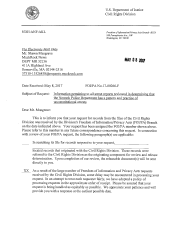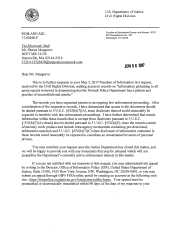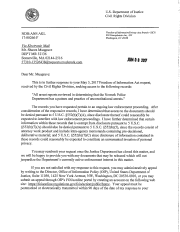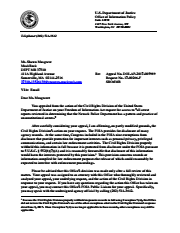Newark arrest practices review materials
| Tracking # |
17-00266-F, DOJ-AP-2017-005989 |
| Submitted | May 5, 2017 |
MuckRock users can file, duplicate, track, and share public records requests like this one. Learn more.
Communications
From: Shawn Musgrave
To Whom It May Concern:
This is a request under the Freedom of Information Act. I hereby request the following records:
All arrest reports reviewed in determining that the Newark Police Department has a pattern and practice of unconstitutional arrests.
Per the 2014 findings report regarding NPD (see p.11-12):
"Although NPD officers generally write reports that facially appear to establish probable cause to arrest, those reports have reflected two categories of problematic practices. First, there is reasonable cause to believe that the NPD has engaged in a pattern or practice of
unconstitutional arrests for behavior perceived as insubordinate or disrespectful to officers— often charged as obstruction of justice, resisting arrest, or disorderly conduct. Second, there is reasonable cause to believe that some number of NPD narcotics arrest reports may not have accurately described the circumstances leading to arrest, and that the NPD has not addressed this problem. This assessment of NPD arrest practices is based on: a review of a random sample of 100 arrest reports and associated incident reports from a three-and-a-half year period, January 2009 to June 2012; NPD policy; IA files; Use of Force Reports; site visits to the NPD; interviews with stakeholders in the criminal justice system; and information provided by community members."
As this request is submitted in my capacity as a professional reporter who covers criminal justice and the federal Department of Justice as part of an ongoing project, I assert that I am appropriately categorized as a "media requester" for the purpose of assessing any applicable fees. Furthermore, given the intense public interest in the consent decree process and police accountability, I furthermore assert that the requested materials qualify for a waiver of all fees in the public interest.
In the event that there are fees, I would be grateful if you would inform me of the total charges in advance of fulfilling my request. I would prefer the request filled electronically, by e-mail attachment if available or CD-ROM if not.
Thank you in advance for your anticipated cooperation in this matter. I look forward to receiving your response to this request within 20 business days, as the statute requires.
Sincerely,
Shawn Musgrave
From: FOIArequests, CRT (CRT)
Dear Mr. Musgrave,
This is to inform you that your request for records was received by the Civil Rights Division of the US Department of Justice. Attached is your acknowledgement letter regarding your FOIA request.
Thank You,
FOI/PA Branch
Civil Rights Division
U.S. Department of Justice
(202) 514-4210 - Main
CRT.FOIArequests@crt.usdoj.gov<mailto:CRT.FOIArequests@crt.usdoj.gov>
From: MuckRock.com
To Whom It May Concern:
I wanted to follow up on the following Freedom of Information request, copied below, and originally submitted on May 5, 2017. Please let me know when I can expect to receive a response, or if further clarification is needed.
Thanks for your help, and let me know if further clarification is needed.
From: FOIArequests, CRT (CRT)
Mr. Musgrave,
We are still processing your request pertaining to the Newark Police Department. You should be receiving a response letter soon in regards to it.
Thank You,
FOI/PA Branch
Civil Rights Division
U.S. Department of Justice
(202) 514-4210 – Main
CRT.FOIArequests@crt.usdoj.gov<mailto:CRT.FOIArequests@crt.usdoj.gov>
-

~WRD000
From: FOIArequests, CRT (CRT)
Dear Ms. Musgrave,
Attached is our response letter regarding your FOIA request to the Civil Rights Division of the US Department of Justice.
Thank You,
FOI/PA Branch
Civil Rights Division
U.S. Department of Justice
(202) 514-4210 - Main
CRT.FOIArequests@crt.usdoj.gov<mailto:CRT.FOIArequests@crt.usdoj.gov>
From: Shawn Musgrave
Hello -
Before I appeal this blanket denial of my request, I ask that your office reconsider your response.
There may be some confusion as to what I'm seeking. The denial letter dated June 8, 2017, misquotes my FOIA as seeking "information pertaining to all arrest reports reviewed in determining that the Newark Police Department has a pattern and practice of unconstitutional arrests." It is unclear where the "information pertaining to" was added to my request, but I see it also made its way into the acknowledgement letter dated May 8, 2017.
The substantive portion of my May 5, 2017 request reads: "All arrest reports reviewed in determining that the Newark Police Department has a pattern and practice of unconstitutional arrests." The "information pertaining to" verbiage is not mine.
The present FOIA request thus seeks the actual arrest reports that were reviewed by the Civil Rights Division during its assessment of the Newark Police Department's practices. The exemptions cited in the CRD's rejection letter do not apply at all to these documents. The requested records do not pertain to any ongoing law enforcement investigation — as the CRD investigation is now closed and a consent decree concluded between the department and the federal government — nor is there any information within these documents exempt from disclosure under attorney work-product, deliberative process, or any similar process privilege. Exemptions b(5), b(7)(A), and b(7)(C) are entirely inapplicable to the requested arrest reports.
In light of the above, please revisit my request and release the records in keeping with your obligations under the FOIA. Please apprise me promptly of your office's decision. I will appeal the denial in full of this FOIA request by the end of next week if I do not hear any response by that time.
Respectfully,
Shawn Musgrave
From: Hermilla, Nelson (CRT)
Dear Mr. Musgrave:
I received your note below and I agree that your point on the scope of your request is appropriate. You were not requesting records that might be derivative from the arrest
records as could potentially be implied from this office’s including “pertaining to arrest records” within the quotation marks, but instead, you wish to view the exact arrest records that the Division used
to make its finding of discrimination.
I’ve attached a re-issue of this office’s June 8, 2017 denial of access to your Freedom of Information Act request which I have attached. In my re-issued letter, I have quoted your letter exactly
as you have written it. My apologies for the oversight.
Further, per your note below you state:
”The requested records do not pertain to any ongoing law enforcement investigation”
You are quite correct in that there is no longer an ongoing “investigation,” however, there is an active enforcement being conducted regarding 42 USC 14141 on a pattern and
practice of unlawful conduct. If you have assumed that there must be an “investigation” before there is an active “law enforcement proceeding” then the assumption in your note that B7A
is very understandable, but incorrect.
Please note in my attached letter as well as the first draft of this office’s response letter, this office is very careful to state “law enforcement proceeding.” At no point within
the letter does it state that there is an open “investigation.” In 1986, Congress – realizing there are many instances other than investigations where the sensitivity of the matter
needs protection for law enforcement purposes – changed the language in the FOIA statute to enable federal agencies to deny access to records in stages of enforcement that are
continuing after the close of an investigation. There is no requirement that there be an active “investigation” in order to deny access to records on the basis of B7A
The end of an investigation represents merely the first stage of the Special Litigation Section’s review.
The Civil Rights Division’s enforcement action is currently engaged in an active, sensitive stage of the enforcement where the Department of Justice and the Newark Police Department are
implementing the enforcement plan which is the type of active matter that Congress envisioned for protection which it passed the language of the statute for 5 USC 552(b)(7)(A)
to be “enforcement proceeding.” The courts have unanimously upheld 5 USC 552(b)(7)(A) denials of access where release of records would result in a potential to jeopardize an
active law enforcement proceeding such as the Department’s enforcement action involving the Newark Police Department.
Any discriminatory arrest records are exempt from disclosure at this stage of the enforcement proceeding without having to claim work product and other applicable privileges.
You are welcome to call me on 202-616-3959 if you have questions regarding your request or if you wish to discuss further the other bases on which the Civil Rights Division has denied access to
your request for arrest records.
Thank you for the opportunity to clarify the Division’s letter to you.
Sincerely,
Nelson D. Hermilla, Chief
FOI/PA Branch
Civil Rights Division
United States Department of Justice
-

image001
From: Shawn Musgrave
Mr. Hermilla -
Thank you for responding so quickly. I will be appealing CRD's determination as to the "law enforcement proceedings" exemption.
Before that, though, can we agree that exemption b(5) is not applicable? While you said in your emailed note that you consider the requested records exempt from disclosure even "without having to claim work product and other applicable privileges," but your new rejection letter still contains a reference to b(5). I'd prefer not to rebut an exemption needlessly.
Thanks,
Shawn
From: Hermilla, Nelson (CRT)
Mr. Musgrave,
You are welcome to appeal or litigate as you choose. As I don’t have to remind you, it is your right to do so. If I were in your
role as requester, I might also seek a second or third opinion. There is no need to take my word for it.
I respectfully disagree with your view that Exemption 5 does not apply. I base my disagreement on almost 35 years of litigating
Exemption 5 and observing the courts’ reasoning in the context of Civil Rights Division enforcement actions.
Attorney work product encompasses all evidence gathered by attorneys in reasonable anticipation of litigation. It is one of the broader
privileges in FOIA and discovery. On this standard, Exemption 5 certainly applies to arrest records collected in reasonable anticipation of litigation.
Perhaps you will be the requester that changes the law.
Thanks for your note and your interest.
Sincerely,
Nelson D. Hermilla, Chief
FOI/PA Branch
Civil Rights Division
From: Shawn Musgrave
Mr. Hermilla -
Thank you for outlining your agency's position in further detail as to exemption b(5). I certainly will get other opinions.
Respectfully, I ask that you do the same. The case law may end up bearing out your arguments about the applicability of exemptions. I hope it does not, obviously.
But there remains the more fundamental issue of whether the public interest is served by withholding the arrest reports until the NPD is no longer under a federal enforcement plan, i.e., for the next four years, at least. These documents are central to a matter of considerable public interest and policymaking, not only by their nature but also because of the role they played in the DOJ's findings that the NPD was abusing its power.
The public interest must play a role in determining whether to release records under the FOIA, particularly in cases such as these when no statute mandates withholding the documents in question. Any speculative jeopardy to a law enforcement proceeding — one that has already resulted in a court-enforced consent decree as well as extensive documentation of the CRD's findings based on those records — does not outweigh the clear public interest in disclosure of these arrest reports.
In his 2009 memo on the "presumption of openness" principle, former Attorney General Holder emphasized one clear implication: "First, an agency should not withhold information simply because it may do so legally. [....] An agency should not withhold records merely because it can demonstrate, as a technical matter, that the records fall within the scope of a FOIA exemption." On his first day in office, President Obama laid this out more directly: "The Government should not keep information confidential [....] because of speculative or abstract fears."
Although neither are still in office, both President Obama's and Mr. Holder's guidelines still apply to the FOIA process and request determinations. And certainly their positions still hold that the public interest should outweigh needless application of exemptions on technical grounds to head off theoretical harms.
Thank you for considering this FOIA request in, as President Obama put it, "a spirit of cooperation."
Best,
Shawn
From: MuckRock.com
To Whom It May Concern:
I wanted to follow up on the following Freedom of Information request, copied below, and originally submitted on May 5, 2017. Please let me know when I can expect to receive a response, or if further clarification is needed. You had assigned it reference number #17-00266-F.
Thanks for your help, and let me know if further clarification is needed.
From: Hermilla, Nelson (CRT)
Dear Mr. Musgrave:
Please don’t hesitate to call me on 202-616-3959 per your email below. I’ll be glad to discuss your request with you. I’ve attached a copy of the Division’s June 8, 2017 denial of access to your request sent to you on June 8.
Since the United States Department of Justice’s current enforcement interests preclude making a discretionary waiver of the applicable Exemptions, you may wish to direct a request to the State of
New Jersey. Perhaps the state has an access statute similar to the federal statute and, consequently, the State of New Jersey may be able to consider your interests in accessing sensitive records that
were created in a local jurisdiction.
I hope this information is of some assistance to you.
Sincerely,
Nelson D. Hermilla, Chief
FOI/PA Branch
Civil Rights Division
United States Department of Justice
July 13, 2017
Department of Justice, Civil Rights Division
Nelson D. Hermilla, Chief
FOIA/PA Branch
Civil Rights Division
Department of Justice
Room 311, NALC Building
Washington, DC 20530
This is a follow up to request number 17-00266-F:
To Whom It May Concern:
I wanted to follow up on the following Freedom of Information request, copied below, and originally submitted on May 5, 2017. Please let me know when I can expect to receive a response, or if further clarification is needed. You had assigned it reference number #17-00266-F.
Thanks for your help, and let me know if further clarification is needed.
-

image001
From: Shawn Musgrave
To Whom It May Concern:
I hereby appeal the rejection in full of my FOIA request to the Justice Department, Civil Rights Division (CRD). The request was assigned tracking number 17-00266-F. In addition to the particular arguments made below, I ask that the Office of Information Policy review CRD's determination for any other deficiencies with regard to the agency's obligations under the FOIA, including the "foreseeable harm" standard established in the 2016 revisions to the statute.
On May 5, 2017, I requested the following materials from CRD: "All arrest reports reviewed in determining that the Newark Police Department has a pattern and practice of unconstitutional arrests."
As I elaborated in my request letter, findings of fact from CRD's review of such arrest reports contributed to a 2014 report and a subsequent consent order between the Justice Department and the Newark Police Department. However, the present request is for the raw materials and not for any analytical or investigative documentation produced by the CRD or its employees.
And yet, in a letter dated June 8, 2017, the FOIA chief of CRD rejected my request in full. His response fails to apply the narrow and specific invocation of exemptions as required under both the letter and spirit of the FOIA. Furthermore, his invocation of potentially applicable statutes does not follow the newly enacted "forseeable harm" standard as established under the 2016 amendments to the FOIA statute.
The rejection letter invokes three exemptions: b(7)(C), b(7)(A) and b(5). The first is easily dismissed, as arrest reports are some of the most fundamentally public documents in the realm of government records. It is difficult to think of a jurisdiction in which arrest reports are not easily obtainable in whole or in part under either a public records law or even by simple request without resorting to a formal records request. Even if the FOIA exempts portions of a given arrest report, such portions are easily redacted in part. The arrest records cannot be withheld in their entirety or even in substantial part under b(7)(C) absent some extraordinary contents that were not discussed in the rejection letter.
It is more likely that b(7)(A) applies here, since the records were collected in the course of a law enforcement proceeding. However, it is difficult to understand how, as the CRD reject letter broadly asserts, production of the requested records "could reasonably be expected to interfere" with law enforcement proceedings. The relevant law enforcement proceeding against the NPD has resulted in a court-enforced consent order. Furthermore, the records in question are between 6 to 8 years out-of-date, as the CRD's assessment of records entailed review of "a random sample of 100 arrest reports and associated incident reports from a three-and-a-half year period, January 2009 to June 2012," per the CRD's 2014 findings report. Any further prosecution or legal action against the NPD for its violation of the consent order will rely on an assessment of arrest reports for arrests executed after the signing of the consent order. In short, the requested records are of minimal value to the law enforcement proceeding, and their release is unlikely to interfere in any way. Even if b(7)(A) is applicable here, it is undercut considerably by the "foreseeable harm" standard as enacted in 2016. The CRD's rejection letter did not outline any concrete way in which release of these records might foreseeably harm the agency's interests. That is because any such harm is speculative at best. The arrest records cannot be withheld in their entirety or even in substantial part under b(7)(A).
The final exemption invoked by CRD — b(5) — has been invoked in an overly broad manner that fails to meet either the specificity or narrowness requirements for applying exemptions. Foremost, it is unreasonable to characterize raw materials such as the requested records as "attorney work product" because attorneys reviewed them in the course of the civil rights investigation of the NPD. The "attorney work product" exemption is meant to protect documents that reflect the mental processes and potential litigation strategies of government attorneys. According to the 2014 findings report, the requested arrest reports were selected at random from among materials provided by the NPD — they do not even reflect any attorney's determination as to which reports should be considered in reviewing police practices. It is even more absurd to characterize the requested records as "intra-agency memoranda" containing pre-decisional, deliberative material. I constructed this FOIA so as to avoid asking for such materials in any way. By the very text of my request, I seek arrest reports drafted by another agency entirely. These are documents created by a separate agency entirely, and are clearly not memoranda containing deliberative material. Finally, even if b(5) applies to any part of the requested records, the "foreseeable harm" standard compels production. There is simply no reasonably foreseeable harm in releasing the instant records, and the CRD has not attempted to contend otherwise.
For the above and any other reasons deemed appropriate by the OIP, I ask that my request be remanded to CRD for a good faith search and provision of the requested arrest records.
Respectfully,
Shawn MusgraveTo Whom It May Concern:
I hereby appeal the rejection in full of my FOIA request to the Justice Department, Civil Rights Division (CRD). The request was assigned tracking number 17-00266-F. In addition to the particular arguments made below, I ask that the Office of Information Policy review CRD's determination for any other deficiencies with regard to the agency's obligations under the FOIA, including the "foreseeable harm" standard established in the 2016 revisions to the statute.
On May 5, 2017, I requested the following materials from CRD: "All arrest reports reviewed in determining that the Newark Police Department has a pattern and practice of unconstitutional arrests."
As I elaborated in my request letter, findings of fact from CRD's review of such arrest reports contributed to a 2014 report and a subsequent consent order between the Justice Department and the Newark Police Department. However, the present request is for the raw materials and not for any analytical or investigative documentation produced by the CRD or its employees.
And yet, in a letter dated June 8, 2017, the FOIA chief of CRD rejected my request in full. His response fails to apply the narrow and specific invocation of exemptions as required under both the letter and spirit of the FOIA. Furthermore, his invocation of potentially applicable statutes does not follow the newly enacted "forseeable harm" standard as established under the 2016 amendments to the FOIA statute.
The rejection letter invokes three exemptions: b(7)(C), b(7)(A) and b(5). The first is easily dismissed, as arrest reports are some of the most fundamentally public documents in the realm of government records. It is difficult to think of a jurisdiction in which arrest reports are not easily obtainable in whole or in part under either a public records law or even by simple request without resorting to a formal records request. Even if the FOIA exempts portions of a given arrest report, such portions are easily redacted in part. The arrest records cannot be withheld in their entirety or even in substantial part under b(7)(C) absent some extraordinary contents that were not discussed in the rejection letter.
It is more likely that b(7)(A) applies here, since the records were collected in the course of a law enforcement proceeding. However, it is difficult to understand how, as the CRD reject letter broadly asserts, production of the requested records "could reasonably be expected to interfere" with law enforcement proceedings. The relevant law enforcement proceeding against the NPD has resulted in a court-enforced consent order. Furthermore, the records in question are between 6 to 8 years out-of-date, as the CRD's assessment of records entailed review of "a random sample of 100 arrest reports and associated incident reports from a three-and-a-half year period, January 2009 to June 2012," per the CRD's 2014 findings report. Any further prosecution or legal action against the NPD for its violation of the consent order will rely on an assessment of arrest reports for arrests executed after the signing of the consent order. In short, the requested records are of minimal value to the law enforcement proceeding, and their release is unlikely to interfere in any way. Even if b(7)(A) is applicable here, it is undercut considerably by the "foreseeable harm" standard as enacted in 2016. The CRD's rejection letter did not outline any concrete way in which release of these records might foreseeably harm the agency's interests. That is because any such harm is speculative at best. The arrest records cannot be withheld in their entirety or even in substantial part under b(7)(A).
The final exemption invoked by CRD — b(5) — has been invoked in an overly broad manner that fails to meet either the specificity or narrowness requirements for applying exemptions. Foremost, it is unreasonable to characterize raw materials such as the requested records as "attorney work product" because attorneys reviewed them in the course of the civil rights investigation of the NPD. The "attorney work product" exemption is meant to protect documents that reflect the mental processes and potential litigation strategies of government attorneys. According to the 2014 findings report, the requested arrest reports were selected at random from among materials provided by the NPD — they do not even reflect any attorney's determination as to which reports should be considered in reviewing police practices. It is even more absurd to characterize the requested records as "intra-agency memoranda" containing pre-decisional, deliberative material. I constructed this FOIA so as to avoid asking for such materials in any way. By the very text of my request, I seek arrest reports drafted by another agency entirely. These are documents created by a separate agency entirely, and are clearly not memoranda containing deliberative material. Finally, even if b(5) applies to any part of the requested records, the "foreseeable harm" standard compels production. There is simply no reasonably foreseeable harm in releasing the instant records, and the CRD has not attempted to contend otherwise.
For the above and any other reasons deemed appropriate by the OIP, I ask that my request be remanded to CRD for a good faith search and provision of the requested arrest records.
Respectfully,
Shawn Musgrave
From: OIP-NoReply@usdoj.gov
08/11/2017 01:43 PM FOIA Request: DOJ-AP-2017-005989
From: OIP-NoReply@usdoj.gov
DOJ-AP-2017-005989 has been processed with the following final disposition: Affirmed on Appeal.
Files
pages





